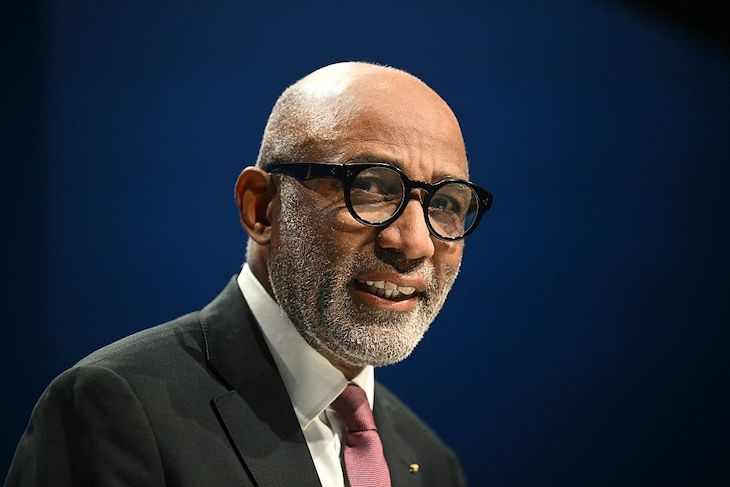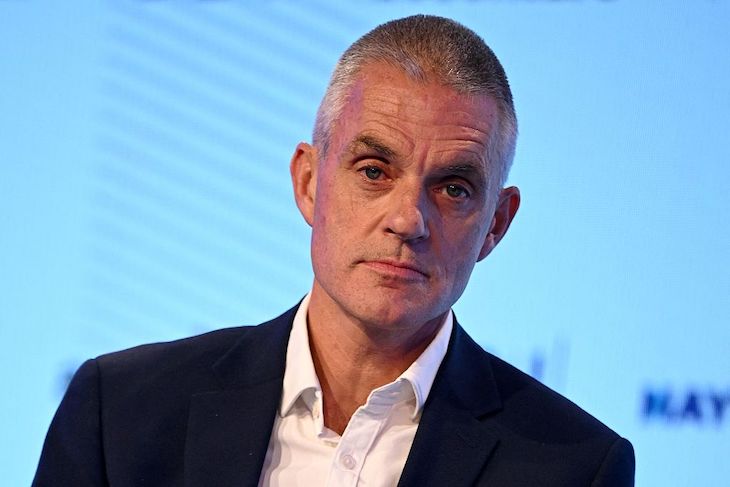I’m not going to rehash here the details of the memorandum by Michael Prescott, the former independent editorial standards adviser to the BBC, which has now led to the resignations of both Tim Davie, director-general, and Deborah Turness, CEO of BBC News. You’d have to have been in a cave for the past week – or, perhaps, watching BBC News – not to know about the story. The issue now is, rather, what, or specifically who, comes next.
If the BBC wants to secure its future and regain trust, it should make Trevor Phillips director-general
One of the problems which holed Davie below the waterline from the start was that he had no editorial or journalistic experience, but was nonetheless the BBC’s editor-in-chief.
Davie often seemed clueless around editorial issues when challenged. In 2021, for example, the BBC ran a story about an attack on Jewish children in Oxford Street. It chose to blame the children themselves for supposedly shouting racist remarks at the Muslims who attacked them. That was, however, simply untrue. The Board of Deputies, the Jewish communal body, collated evidence – including forensic analysis of various audio recordings – which proved the BBC’s story was wrong. But when they met Davie, he simply stonewalled, utterly out of his depth. The following year an Ofcom inquiry found that the BBC was guilty of ‘serious’ editorial failures. How familiar that phrase is now.
As for Turness, her resignation statement shows that she still doesn’t get the problems which her own tenure exacerbated. She should be ashamed, rather than proud of her time at the BBC. BBC Verify, her ludicrous idea that was intended as a source of reliable fact checking, has been repeatedly shown to itself get things completely wrong.
Those of us who have complained in the past about ‘BBC bias’ may actually have been over-generous to the corporation. I have always tended to think the problem is a form of groupthink – that the pool from which the BBC draws the vast majority of its reporters and editors has more or less the same background, the same education, the same outlook and the same aims, and is – broadly – centre-left. Anything that isn’t a standard centre-left view is thus treated with suspicion. The Prescott memo, however, shows that the problem is worse – not a failure to appreciate other views but the deliberate and wilful distortion of stories, or – as in its coverage of the so-called ‘trans debate’ – a near-Stalinist blackout of any views which deviate from the Stonewall agenda.
What is surely clear to anyone who isn’t either a BBC staffer or a propagandist for the corporation is that the BBC’s bias is real and dangerous. It is dangerous to the BBC’s rationale as a supposed source of reliable news, and thus to the case for its existence in anything like its current form. And, more importantly, it is dangerous to our democracy. When a national institution that is a self-proclaimed purveyor of facts and truth is, in reality, giving a left-liberal slant to those facts and the truth, it is not only national debate that is undermined but democracy itself.
The choice of the next director-general is critical, which even the BBC’s cheerleaders should understand given that its charter is up for renewal in 2027. There are a number of pre-requisites for the appointment. First, he or she should have serious and deep editorial experience. Unlike Davie, they need to be able to see problems and issues before they turn into a crisis. Would the BBC, for instance, have broadcast a documentary about Gaza narrated by the son of a Hamas operative – and paid him – if the director-general understood what is good and bad journalism?
Second, they need to be an outsider. The fundamental problem with the BBC is that – to put it bluntly – it is made up of the clones I outlined above. Realistically, it will take years to change that. Appointing a BBC staffer as director-general means more of the same. If the BBC is to change it has to come from the top down. That means the next director-general needs to be someone who is not steeped in the BBC way of doing things and the BBC’s way of viewing things.
It will be a fearsomely difficult undertaking, because it will be unrelenting. It needs someone who is both intellectually ferocious, confident in their judgment and has such deep and acclaimed experience as a journalist and programme maker that they will be able to quash what will certainly be deep hostility from within the BBC.
Fortunately, at least one such person exists. I can think of no more brilliant choice than Trevor Phillips. At the moment he writes a thought-provoking column for the Times and presents by far the best Sunday morning political programme, on Sky News. He has an outstanding history as a reporter, an editor and a programme maker. He is centre-left, so cannot be dismissed as a right-wing stooge, but has the intellectual self-confidence not to be hidebound by any dogma or received wisdom, as anyone who has read his column will attest.
If the BBC wants to secure its future and regain trust, it should make Trevor Phillips the next director-general.







Comments